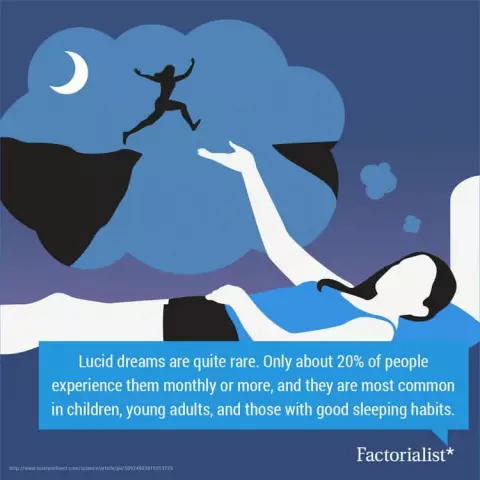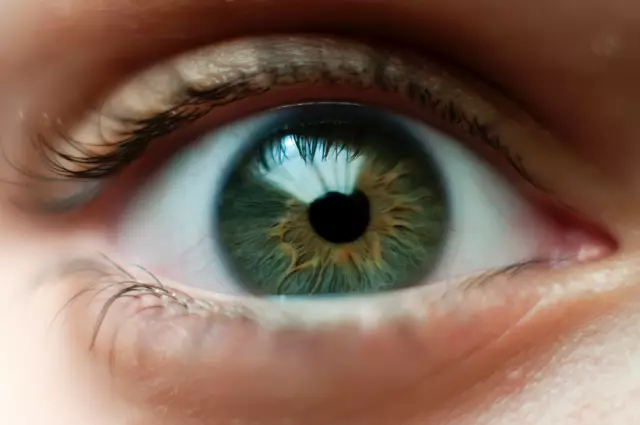- Author Rachel Wainwright wainwright@abchealthonline.com.
- Public 2023-12-15 07:39.
- Last modified 2025-11-02 20:14.
Sleep and dreams: 9 interesting facts
The workings of the brain are extremely complex and largely unexplored. This is confirmed by the features of mental and physiological processes that appear when a person is sleeping. Let's talk about some of them.

Source: depositphotos.com
A person remembers only 10% of dreams
Each of us has come across such a phenomenon: waking up after a very vivid and impressive dream, we want to share its content with others, but the understanding quickly comes that almost nothing is remembered (except, perhaps, some sensation, mood or image).
Scientists have found that in the first five minutes after waking up from the memory, half of the content of the dream disappears, and in the next five minutes - another 40% of the information. The physiological meaning of this process has not been established. But practically everyone knows about the cases of memorizing the remaining 10%: they include the image of Frankenstein, dreamed of by Mary Shelley, DI Mendeleev's periodic table and a number of well-known scientific discoveries and artistic achievements.
The sleep content can be influenced by the environment in which the sleeper is
Most people are familiar with the phenomenon of the fusion of reality and sleep. It manifests itself when external factors seem to be embedded in the fabric of the dream. This role can be played by sounds, smells, fluctuations in the air and changes in its temperature, even features of the physical state of the sleeping person. For example, if the body needs to replenish its fluid reserves, a person sees himself in a dream looking for a spring, drinking water, etc. Similarly, a hungry person sees food in a dream and eats it. Interestingly, in this case, the feeling of thirst or hunger disappears for a while, then returns and the episode of satisfaction of desires is repeated with the same result.
Blind people dream too
People with acquired blindness see the same dreams as the sighted. If blindness is congenital, dreams also exist. They are based on other sensations (olfactory, tactile, auditory), but can be very intense and emotional.
The content of dreams depends on gender and age
A mentally healthy person usually has dreams about himself (something like films with himself in the lead role). Similar dreams appear in a child from the age of three (the smallest do not see themselves in a dream). Children often have nightmares, but by the age of seven or eight this feature usually disappears.
Representatives of the stronger sex see dreams mainly with the participation of men. In women's dreams, women and men appear equally often.
Dreamless sleep is bad for mental health
The complete absence of dreams is an alarming sign. It has been established that in this way severe mental disorders are manifested.
Another fact has been experimentally confirmed: if a person fails to experience the REM sleep phase for two to three days, during which dreams come, he becomes absent-minded, irritable, aggressive. As the study continued, the subjects developed hallucinations and other signs of mental disorder. At the same time, the total duration of night sleep was quite sufficient for a good rest. In addition, scientists noticed that the brains of people who were returned to the ability to dream normally began to make up for lost impressions: the subjects saw extremely vivid and meaningful dreams for several days after the end of the experiment, the duration of which was much longer than normal.
Dreams are not always colored
There is an opinion that colored dreams indicate the presence of mental disorders. This is not true. Most people see about 88% of their dreams in color. Moreover, the content of the dream has nothing to do with its color perception.
The events and people we see in dreams are partly familiar to us
During sleep, the brain continues to process sensations and emotions experienced in reality, creating bizarre combinations of familiar situations and images. Therefore, the belief that we see strangers in our dreams is not based on anything. Every face that appeared in front of a person in a dream, at least in passing, was seen by him in reality.
In life, different people often find themselves in similar situations and that is why they can dream of the same content. Most often, there are dreams in which we are in a hurry somewhere, are late, ride in transport, pass exams, catch up with someone (or run away).

Source: depositphotos.com
The content of dreams cannot be taken literally
Often, certain circumstances are very accurately reproduced in dreams, but dreams cannot be perceived as a prediction of the future or a guide to action. They have nothing to do with upcoming events. Rather, they are a complex mixture of memories of known situations and impressions.
The body is practically paralyzed during sleep
During REM sleep, signals are sent to the spinal cord, forcing it to relax all muscles in the body as much as possible. The existence of this mechanism is associated not only with the need to give the body a rest. We usually dream of ourselves in the role of the most active participant, and muscle mobility is blocked to minimize the risk of self-harm.
The functioning of the brain of a person who is sleeping is not well understood. Perhaps in the coming years, researchers will receive information that will allow deciphering dreams, and learn how to apply it in practice, for example, in the treatment of mental disorders.
YouTube video related to the article:

Maria Kulkes Medical journalist About the author
Education: First Moscow State Medical University named after I. M. Sechenov, specialty "General Medicine".
Found a mistake in the text? Select it and press Ctrl + Enter.






